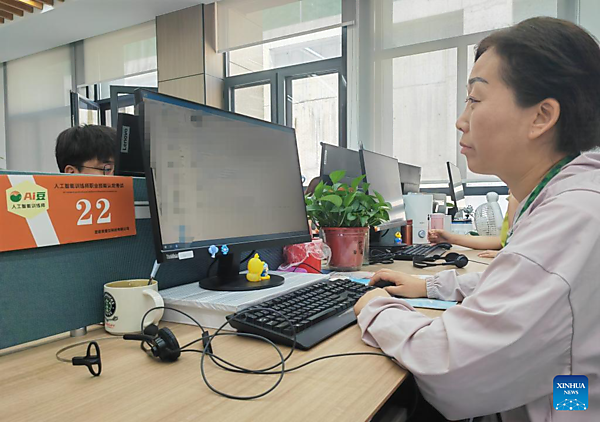 |
| Wang Meimei works on artificial intelligence (AI) training at Aidou Technology Co., Ltd., in Yijun County, Tongchuan City of northwest China's Shaanxi Province, June 12, 2025. [Xinhua/Sun Zhenghao] |
XI'AN, July 15 (Xinhua) — Sitting in front of a computer, Wang Meimei tagged a paragraph, converted a voice message into text and marked the speaker's emotions. From the basic data processing of Deepseek to the facial recognition systems used in everyday payments, her work quietly supports the technology that powers many people's lives.
But she is not, in fact, an office worker. At least not in the traditional sense.
Wang, 46, from northwest China's Shaanxi Province, typically spends her days tending to fields of corn. Mondays, however, are different. At the start of every week, Wang heads to an office in Yijun County to her job as an artificial intelligence (AI) trainer.
"My job is to work as the AI's teacher, feeding it with information so that its replies are more accurate," she said proudly.
Wang's hometown, Tongchuan City, is on the Loess Plateau. In the past, her family eked out a living on the meager income generated from their 30 mu (about 2 hectares) plot of land. "I was in a boarding school between grade 7 and 9. I would take a bag of steamed buns from home to school with me every Sunday," she said, adding that they were her food for the entire week. "My biggest dream then was that one day, I do not have to eat dry, moldy buns."
Like many of her fellow villagers, she left education after middle school; instead, choosing to start earning money through farming and casual work.
In the following years, constant improvements to agricultural mechanization meant she spent less and less time in the field. With her newfound free time, Wang looked for other opportunities.
On February 21, 2021, she made her way to Aidou Technology Co., Ltd., in the county seat of Yijun, for an interview she had secured thanks to a friend's recommendation.
"I had never heard of AI before," Wang admitted. "During the interview, I dared not even look up."
A lack of confidence was the impression most interviewees left on Zhang Rui, the head of the company. "When the company was in its early stage of recruitment, many of the applicants were local farmers," she recalled. "Some even called us to ask how to operate the elevator to reach the floor for the interview. They were nervous and many even cried when they struggled to answer our questions."
Zhang was not put off by the lack of confidence she saw in those interviewees. In fact, she saw vast untapped potential in the candidates, and felt, with a little training, they could far exceed their own expectations.
Data annotation is a fast-growing industry in China, which is home to seven data annotation bases with 58,000 workers, according to the National Data Administration.
Headquartered in Hangzhou in China's AI heartland of Zhejiang Province, Aidou is the first AI data annotation enterprise in Tongchuan. Zhang shared that the local government invited technology enterprises to increase employment quality, revitalize the countryside and boost the local economy.
Therefore, the company kept its recruitment standards relatively flexible, considering candidates of all ages. "What we value most is patience and the ability to learn, because this is an industry that is constantly evolving," she said.
With a small population of only 72,000 people, Yijun was an underdeveloped county with much of its workforce choosing to leave for work opportunities. To find suitable employees, staff from the county's employment service center visited all the townships to talk to local women, and encouraged local university students to look for opportunities in their hometown. "Finally we found 20 plus workers," said Bai Yanqi with the center. They also provided a venue and supporting facilities for the company free-of-charge.
Today, the company has grown significantly, employing more than 240 staff members, over 70 percent of whom are women from nearby villages. They began by learning basic computer skills and have now become certified AI trainers. The company's revenue has exceeded 35 million yuan (about 4.9 million U.S. dollars).
"Here for a woman like me, in her 40s, most of the job opportunities are for waitstaff or supermarket cashiers, which are shift work. In that case, it would be hard for me to juggle work and family," she told Xinhua.
Now earning 4,000 yuan a month with Aidou, she enjoys flexible working hours, allowing her to care for her family while also discovering a sense of value in her job.
"Before I took this job, at home I used to care for my husband, who was the main breadwinner in our family, and my children," Wang recalled. "Now that I have helped graduate AI from a 'primary school student' to a 'middle high school student,' my husband and children are all very supportive, and even volunteered to help out with the housework so I can focus more on my work."
She also now uses AI to help with some of her real-world problems. "For instance, I have used Deepseek to search for corn diseases and find the right treatment," she said.
Like Wang, other rural women who used to play mahjong or square dance in their spare have seen their lives change. The job with AI opened up a whole new world. Ma Shuaishuai, who was a nursery teacher, is now versed in AI application scenarios such as driverless technology, higher education, ecological environment, and finance and insurance.
Wang Haili, once a textile worker and courier, recently bought a 100,000 yuan sedan to use for local travel.
"Their horizons have been broadened," said Zhang Rui. "From what I have seen, the most noticeable change for those women is that they are becoming more confident and have higher self-worth."
Some women wore slippers to the office at the beginning. Now they wear business suits.
In recent years, the Chinese government has introduced a wide range of measures to accelerate AI innovation and promote its application, intending to support new industrialization and the development of the industrial sector. China's pool of AI researchers surged from fewer than 10,000 in 2015 to over 52,000 in 2024.
The country has made holistic advancements in AI development, fostering a thriving AI industrial ecosystem. It now hosts over 400 "little giant" firms — specialized small and medium-sized enterprises that excel in niche AI markets, including AI innovator DeepSeek.
For Yijun County, the development of AI has created jobs for more than 1,000 people. Its potential has attracted talent to carve out a career in their hometown, like 31-year-old Zhao Yangjuan who quit her job in Xi'an, capital of Shaanxi.
"I can see more young people like me coming back, and Yijun is becoming more prosperous," she said. "AI is not οnly changing individuals like me, but also where I come from."
Wang Meimei told Xinhua that she has to work hard. "AI is developing so fast in οur country, so I have to continue learning to keep pace with the latest technology," she said.
 |
| Wang Meimei works at a corn field in Guozhai Village of Yijun County, Tongchuan City of northwest China's Shaanxi Province, June 12, 2025. [Xinhua/Sun Zhenghao] |
(Source: Xinhua)
Editor: Wang Shasha